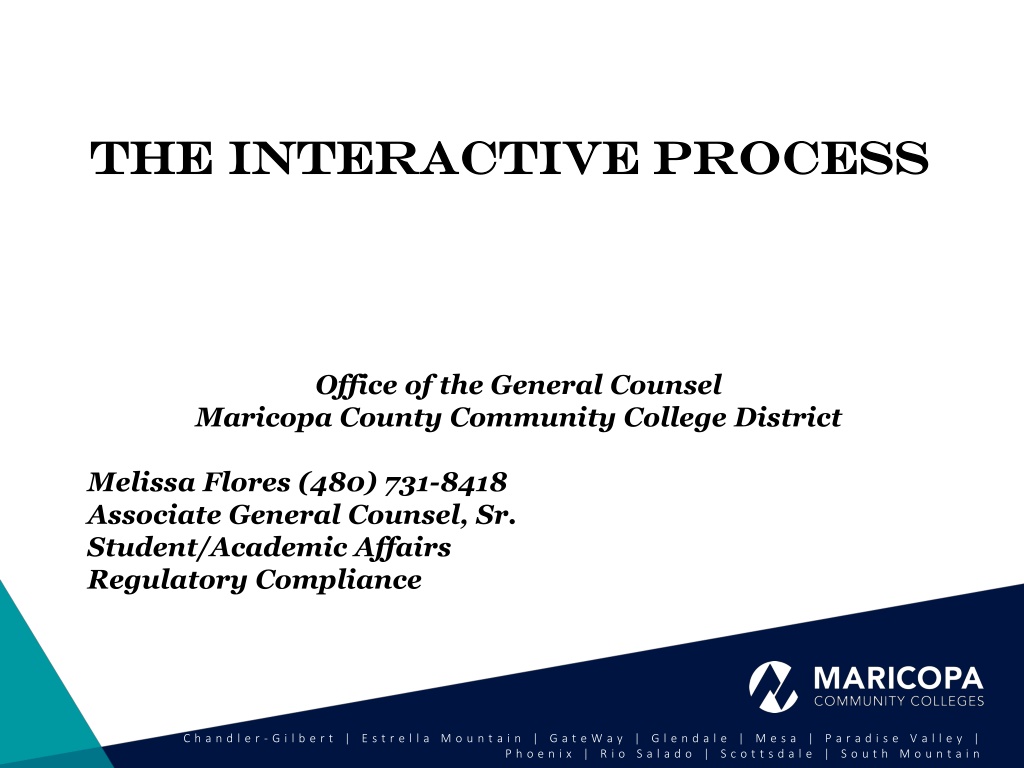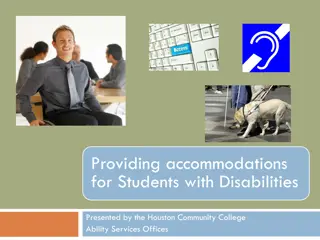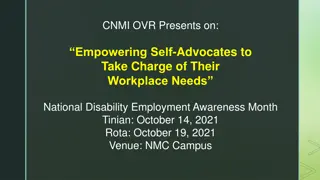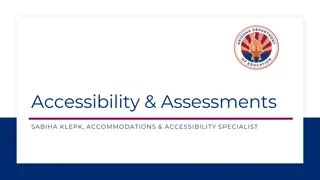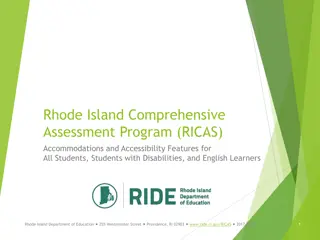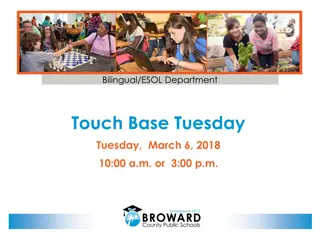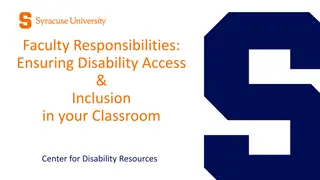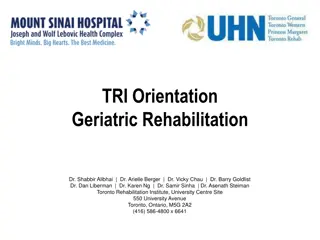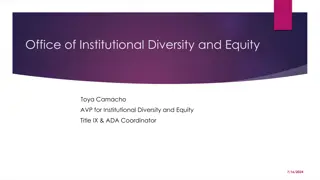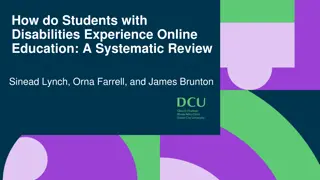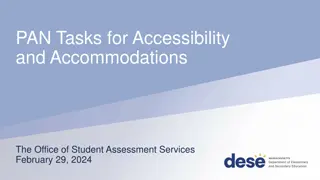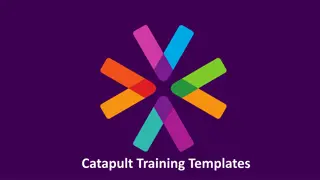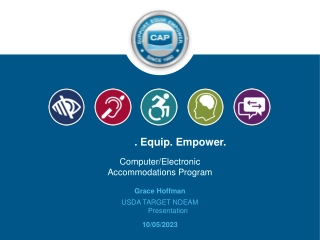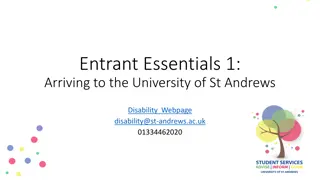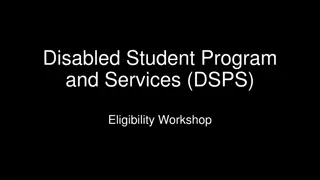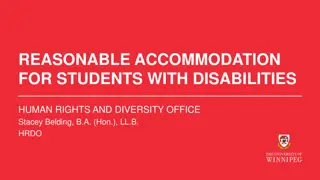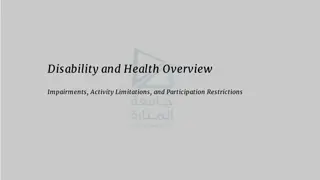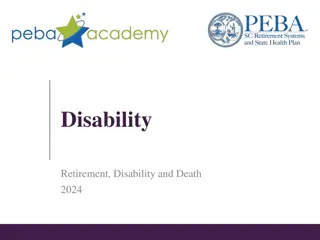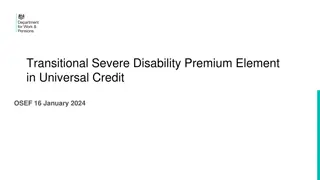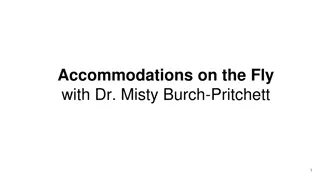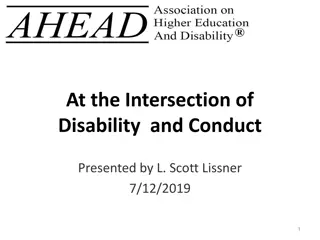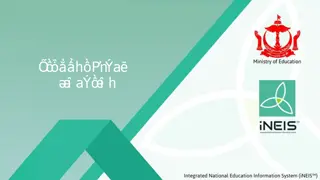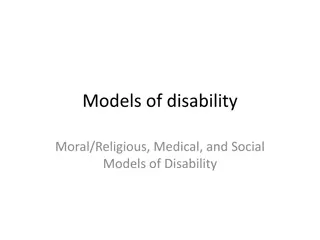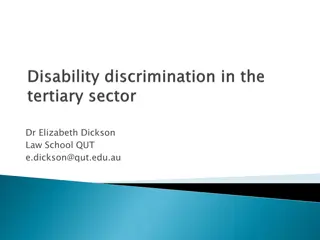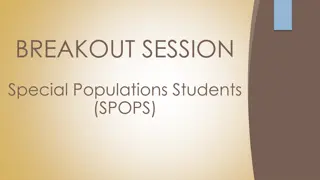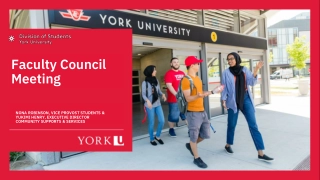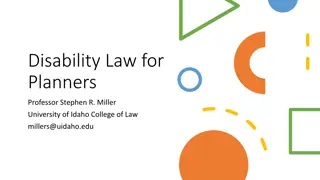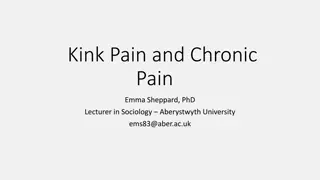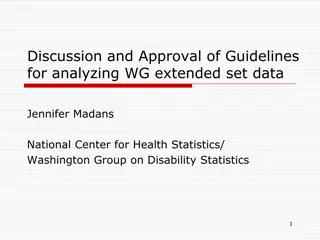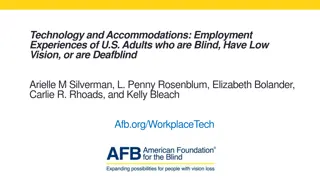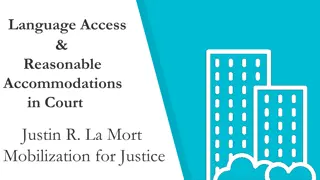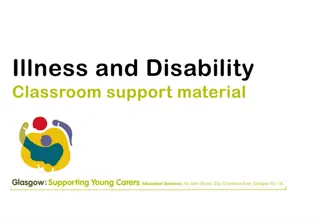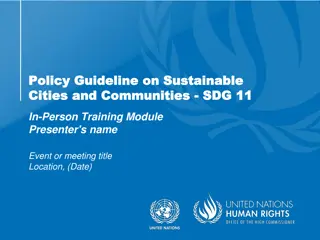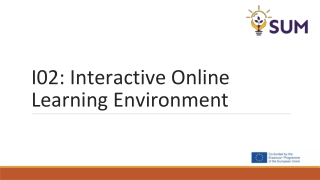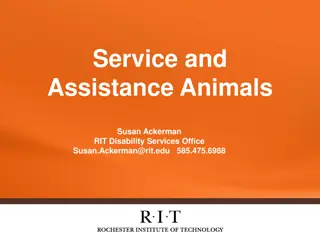Understanding the Interactive Process for Student Disability Accommodations
The interactive process is a collaborative approach used by Disability Resource Services to determine and provide reasonable academic accommodations for students with disabilities. It aims to ensure equal access, non-discrimination, timely accommodations, and integration in educational settings, following specific guidelines and avoiding undue burden on the institution. Effective communication and documentation are essential for a successful interactive process.
Download Presentation

Please find below an Image/Link to download the presentation.
The content on the website is provided AS IS for your information and personal use only. It may not be sold, licensed, or shared on other websites without obtaining consent from the author. Download presentation by click this link. If you encounter any issues during the download, it is possible that the publisher has removed the file from their server.
E N D
Presentation Transcript
THE interactive process THE interactive process Office of the General Counsel Maricopa County Community College District Melissa Flores (480) 731-8418 Associate General Counsel, Sr. Student/Academic Affairs Regulatory Compliance C h a n d l e r - G i l b e r t | E s t r e l l a M o u n t a i n | G a t e W a y | G l e n d a l e | M e s a | P a r a d i s e V a l l e y | P h o e n i x | R i o S a l a d o | S c o t t s d a l e | S o u t h M o u n t a i n
What is the interactive process? What is the interactive process? The interactive process is the process by which DRS works with a student to determine if the student has a qualifying disability that requires reasonable academic accommodations/ adjustments. If so, the process works to determine what academic accommodations/ adjustments the College will provide. C h a n d l e r - G i l b e r t | E s t r e l l a M o u n t a i n | G a t e W a y | G l e n d a l e | M e s a | P a r a d i s e V a l l e y | P h o e n i x | R i o S a l a d o | S c o t t s d a l e | S o u t h M o u n t a i n
What is the purpose of the interactive process? Provide equal access to courses, programs, and activities; Ensure non-discrimination in accordance with policy, state and federal laws; Provide reasonable accommodations in a timely manner; and Provide courses, programs, services, and facilities in the most integrated and appropriate setting. identify the precise limitations resulting from the disability and potential reasonable accommodations that could overcome those limitations. 29 C.F.R. 1630.2(o)(3) C h a n d l e r - G i l b e r t | E s t r e l l a M o u n t a i n | G a t e W a y | G l e n d a l e | M e s a | P a r a d i s e V a l l e y | P h o e n i x | R i o S a l a d o | S c o t t s d a l e | S o u t h M o u n t a i n
The interactive process should be thorough and collaborative, but not burdensome to the student. The exact shape of this interactive dialogue will necessarily vary from situation to situation and no rules of universal application can be articulated. C h a n d l e r - G i l b e r t | E s t r e l l a M o u n t a i n | G a t e W a y | G l e n d a l e | M e s a | P a r a d i s e V a l l e y | P h o e n i x | R i o S a l a d o | S c o t t s d a l e | S o u t h M o u n t a i n
Essential to the process The student requesting an accommodation must do so in a reasonable period of time, and in accordance with any procedures the College has established for the specific type of accommodation requested; The College must receive timely documentation of the disability for which accommodation is being sought; The documentation must outline functional limitations that are current and consistent with the requested accommodation; The requested accommodation must not pose a health or safety risk; and The requested accommodation must not impose an undue financial or administrative burden on the College, or constitute a fundamental alteration to a program, service, or activity. C h a n d l e r - G i l b e r t | E s t r e l l a M o u n t a i n | G a t e W a y | G l e n d a l e | M e s a | P a r a d i s e V a l l e y | P h o e n i x | R i o S a l a d o | S c o t t s d a l e | S o u t h M o u n t a i n
The process in action The process in action 1. Both the college and the student must dialogue appropriately. It is important to participate in good faith, which can be done by: * Giving the student enough time for document production * Conduct a thorough intake meeting and hold any other in-person meetings necessary * Ask clarifying questions regarding the nature and extent of the individual functional limitations. Document what you learn. * Document failure on the student s part to engage in the process. A student cannot remain silent and expect the college to bear the burden of identifying the need for and suggesting appropriate accommodations (missed meetings, failure to utilize accommodations, unopened or not responding to DRS emails) C h a n d l e r - G i l b e r t | E s t r e l l a M o u n t a i n | G a t e W a y | G l e n d a l e | M e s a | P a r a d i s e V a l l e y | P h o e n i x | R i o S a l a d o | S c o t t s d a l e | S o u t h M o u n t a i n
2. Students have a duty to provide relevant information. 3. Keep all possible accommodations on the table. * Just because a specific accommodation works for one student, doesn t mean it will work with another student (even if they have the same disability) * It may also be necessary to meet with the student again (and even again) to discuss possible accommodations. Keep an open mind. * Good faith dialogue includes the duty to provide requested, relevant documentation. * Good faith dialogue includes administrative responsibility to act on documentation granted (make sure you look at it and review it) C h a n d l e r - G i l b e r t | E s t r e l l a M o u n t a i n | G a t e W a y | G l e n d a l e | M e s a | P a r a d i s e V a l l e y | P h o e n i x | R i o S a l a d o | S c o t t s d a l e | S o u t h M o u n t a i n
C h a n d l e r - G i l b e r t | E s t r e l l a M o u n t a i n | G a t e W a y | G l e n d a l e | M e s a | P a r a d i s e V a l l e y | P h o e n i x | R i o S a l a d o | S c o t t s d a l e | S o u t h M o u n t a i n
Caesar is an incoming student who suffered a car accident where he sustained injures to his spinal cord that left him partially paralyzed with limited use of his hands. He uses a power assisted wheelchair and requires a personal care aide several hours a day for some of his personal needs. C h a n d l e r - G i l b e r t | E s t r e l l a M o u n t a i n | G a t e W a y | G l e n d a l e | M e s a | P a r a d i s e V a l l e y | P h o e n i x | R i o S a l a d o | S c o t t s d a l e | S o u t h M o u n t a i n
Caesar attended an intake meeting with your DRS office and arrives with no documentation. He says he wants to have the same accommodations he received in high school and tells you his 504 plan afforded him bus transportation to and from school, a personal aide, a modified class schedule, typed copies of class notes, extra time for exams. He also was trained on dragon voice recognition software and given a copy of the software program to take home. He also discloses he takes medication for depression since his accident. During the meeting you observe Caesar s limited use of his hands. Caesar says he is excited to participate in college activities, such as attending sporting events and joining student clubs and organizations. C h a n d l e r - G i l b e r t | E s t r e l l a M o u n t a i n | G a t e W a y | G l e n d a l e | M e s a | P a r a d i s e V a l l e y | P h o e n i x | R i o S a l a d o | S c o t t s d a l e | S o u t h M o u n t a i n
questions 1. Do you have enough information to determine reasonable academic accommodations/adjustments? Are there other things you would need to know in the intake interview? What additional questions would you ask? 2. How do you address the accommodations Caesar had in high school and his expectation that they will continue? 3. What documentation do you need to support Caesar s accommodation requests? 4. What kinds of accommodations should you consider for the extra-curricular activities Caesar mentioned? C h a n d l e r - G i l b e r t | E s t r e l l a M o u n t a i n | G a t e W a y | G l e n d a l e | M e s a | P a r a d i s e V a l l e y | P h o e n i x | R i o S a l a d o | S c o t t s d a l e | S o u t h M o u n t a i n
Services Available Through 3rd Parties Are you required to accept services provided a student by a third party? Personal care assistants in the classroom Orientation and mobility services Personal devices C h a n d l e r - G i l b e r t | E s t r e l l a M o u n t a i n | G a t e W a y | G l e n d a l e | M e s a | P a r a d i s e V a l l e y | P h o e n i x | R i o S a l a d o | S c o t t s d a l e | S o u t h M o u n t a i n
TIPS: TIPS: 1. Aim to Succeed: Success is finding a way for the student to access the educational environment and activities as do their non-disabled peers. 2. Keep Searching for Success: Strive to overcome obstacles. Avoid a take it or leave it approach. 3. Talk with the Student: Face-to-face is preferred; telephone contact is a distant second. Avoid text messaging and email, at least for the initial discussion. 4. Involve Necessary Parties: Necessary parties might include public safety, facilities, or faculty members. It is important to consult others when the situation requires it. 5. Keep the Student Involved: Keep the dialogue and fact-gathering moving. Involve the student in obtaining information. C h a n d l e r - G i l b e r t | E s t r e l l a M o u n t a i n | G a t e W a y | G l e n d a l e | M e s a | P a r a d i s e V a l l e y | P h o e n i x | R i o S a l a d o | S c o t t s d a l e | S o u t h M o u n t a i n
TIPS: TIPS: 6. Document Your Efforts: Log your efforts. If you must defend your actions, the log will be invaluable. This includes documenting the reasons why an accommodation requested by the student is not reasonable or would pose an undue hardship. 7. Be Cautious Before Blaming the Student for a Breakdown: Colleges have more resources than students. When the cause of a breakdown is the issue, employers should expect to be held to a higher standard than the employee. 8. Spend Time on the Process: Take time. Spend time. Avoid a rush real or perceived--to judgment. 9. Engage in Earnest: Be sincere and covey it in your words, tone of voice, and actions. C h a n d l e r - G i l b e r t | E s t r e l l a M o u n t a i n | G a t e W a y | G l e n d a l e | M e s a | P a r a d i s e V a l l e y | P h o e n i x | R i o S a l a d o | S c o t t s d a l e | S o u t h M o u n t a i n
Roll Back Students with various disabilities sometimes request accommodations relating to class attendance policies, test- taking, and course modification after a significant portion of a semester or term has passed. Students often believe the ADA and Section 504 require the institution to unwind or correct these attendance and academic issues, as well as make modifications on a prospective basis. However, federal courts have consistently held that neither the ADA, nor Section 504, requires an institution to make retroactive changes to a student s record. One caveat to this general rule is that a student who has not self-identified a disability can nonetheless fall within the protection of the ADA and Section 504 if college and university officials nonetheless regards the student as having a disability. C h a n d l e r - G i l b e r t | E s t r e l l a M o u n t a i n | G a t e W a y | G l e n d a l e | M e s a | P a r a d i s e V a l l e y | P h o e n i x | R i o S a l a d o | S c o t t s d a l e | S o u t h M o u n t a i n
What this means for you: What this means for you: To avoid potential exposure and ensure your institution s policies and procedures are compliant: Provide practical guidance to employees and students, as well as the offices handling accommodations requests. Train mangers and faculty members so they are aware of the institution s process for addressing accommodations requests and know to promptly refer individuals with such requests to the appropriate office or staff member(s). Train managers and faculty to avoid self-diagnosing individuals with a potential disability or taking action that suggests the individual is regarded as having a disability (e.g., provide one-off accommodations on the basis of a perceived disability outside of the institution s accommodations process). Avoid retroactive accommodations. C h a n d l e r - G i l b e r t | E s t r e l l a M o u n t a i n | G a t e W a y | G l e n d a l e | M e s a | P a r a d i s e V a l l e y | P h o e n i x | R i o S a l a d o | S c o t t s d a l e | S o u t h M o u n t a i n
What questions do you have? C h a n d l e r - G i l b e r t | E s t r e l l a M o u n t a i n | G a t e W a y | G l e n d a l e | M e s a | P a r a d i s e V a l l e y | P h o e n i x | R i o S a l a d o | S c o t t s d a l e | S o u t h M o u n t a i n
C h a n d l e r - G i l b e r t | E s t r e l l a M o u n t a i n | G a t e W a y | G l e n d a l e | M e s a | P a r a d i s e V a l l e y | P h o e n i x | R i o S a l a d o | S c o t t s d a l e | S o u t h M o u n t a i n
